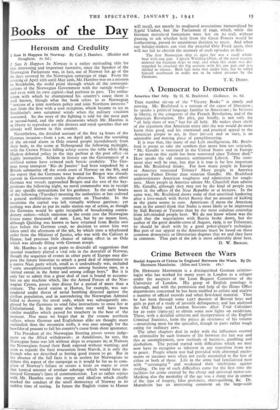A Democrat to Democrats
America Our Ally. By H. N. Brailsford. (Gollancz. 2s. 6d.
Tins number eleven of the " Victory Books " is timely and moving. Mr. Brailsford is a veteran of the cause of liberation ; he speaks a political language familiar to Americans ; he believes in liberty, in the conquests of the French Revolution, and of the American Revolution. His plea, put briefly, is not only for "all help short of war," but for all help. He makes short shrift of the argument that American entry into the war would do more harm than good, and his emotional and practical appeal to the American people to act, in their intei est and in ours, is an admirable and moving piece of pamphleteering.
It is true that, like many of our Left intelligentsia, Mr. Brails- ford is prone to take the symbols that move him too seriously. " Mr. Gandhi is venerated in the United States and in Europe as no man on this earth has been venerated since Tolstoy died." Here speaks the old romantic sentimental Liberal. The state- ment may well be true, but that it is true is far less important than Mr. Brailsford thinks. For how many people in Europe or America venerated Tolstoy? More people in America venerate Father Divine than venerate Gandhi. Mr. Brailsford underestimates American toughness and admiration for tough- ness. More people in America admire Mr. Churchill than admire Mr. Gandhi, although they may not be the kind of people you meet in the offices of the New Republic or at lectures. In the same way, Mr. Brailsford shows some of that uncritical hankering after a love-match with Soviet Russia that no amount of kicking in the pants seems to cure. Americans (I mean the American man in the street) think that Stalin is more likely to be impressed by Sidi Barrani or Taranto than by the most sedulous courtship from left-minded people here. We do not know whose was the fault that the negotiations with Russia broke down, but the author of the great double-cross of August, 1939, is no Tolstoyan; he should be dealt with by a good poker-player's technique. But part of our appeal to the Americans -must be based on those common democratic or liberatarian dogmas that we and they have in common. That part of the job is most admirably done here.
D. W. BROGAN.






























 Previous page
Previous page